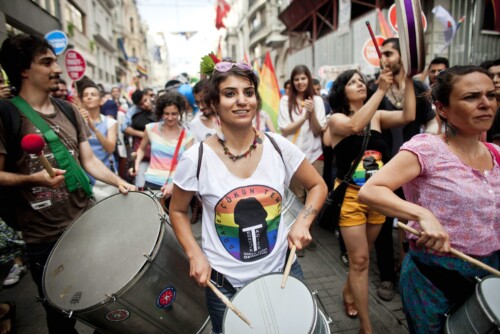Some of the most confrontational contemporary disability politics seem closely related to a range of queer activisms from the past few decades. Of course, many self-identified “crips”—a term increasingly embraced across the spectrum of disability, not solely by those with mobility impairments—also identify as queer. Many others would insist that the defiant reclaiming and reinvention of crip is linked to the critical reinvention—by activists, artists, and scholars—of queer. Most important, queer and crip activisms share a will to remake the world, given the ways in which injustice, oppression, and hierarchy are built (sometimes quite literally) into the structures of contemporary society.
For crip activists, the will to remake the world manifests itself in numerous ways. “Make It Accessible or We’ll Piss Anywhere” one crack-and-peel sticker exclaims. This in-your-face crip assertion, designed to plaster buildings and other locations that make no room for disabled people, transforms a given space by bringing to light the exclusions that structure it. A space that seems open to anyone who might occupy it is exposed as actually constituting very narrow notions of openness and propriety. Bodies and bodily practices perceived as non-normative are forever positioned outside of the “public” that might inhabit such spaces and, through a mixture of flamboyant anger and camp humor, the crack-and-peel sticker, like many queer interventions over the past few decades, pushes toward more expansive public cultures.
In the spirit of the sticker’s crip clarity (“make it accessible”), this essay offers a relatively straightforward thesis: A vibrant queer politics must incorporate a vibrant crip politics (and vice versa).
The project of building crip/queer solidarity is not as “straightforward” as it might first seem, however. In particular, the current political and economic system, called neoliberalism by political theorists (see Lisa Duggan’s essay in this issue for a description of neoliberalism), sometimes offers a limited recognition to representative gay or disabled people. This recognition depends on an acceptance of dominant norms, but for the singular difference of being gay or of being disabled. So for example, Lisa Duggan has argued that some proponents of a narrow version of gay rights have built a “homonormativity,” that mirrors dominant norms—white, middle-class and family-oriented—but for the single difference of same-gendered partners in marital relationships. Similarly, disabled people who seek to mirror the dominant society but for the single difference of physical ability can create a politics that excludes queers and others whose identities set them apart from the dominant norms of white, middle-class family life. Such a politics of singular difference can shut down coalition across identities—such as the crip/queer solidarity I am arguing for here—and can also undermine organizing around issues (poverty, health care, the destruction of the environment, and so forth) not directly connected to identity.
Neoliberalism is the dominant economic and cultural system of our time. It is a system that positions the market as the answer to everything. Any problem is supposed to be best addressed—most effectively and efficiently—through the market. Neoliberalism positions the move of previously public functions into the private sphere of the market as an unequivocal good and unquestionable common sense. As a corollary, any barriers to the workings of that market (and barriers to the flow of capital) should be eliminated through various kinds of deregulation. Proponents of neoliberalism advocate deregulation even if that deregulation requires (or has required in practice) an increasing regulation on the movement of peoples. And neoliberalism, while promising unparalleled freedom and unstoppable growth, exacerbates all kinds of inequalities around the globe. Neoliberal ideology displays a special genius at making lopsided growth, wealth for a few, and immiseration for many more, seem sexy, progressive, and “modern.”
This positioning of neoliberalism as more progressive than conservative regulation, and as the wave of development and the future, means that activist projects can become vehicles for neoliberal policies rather than for social change that will actually challenge the distribution of wealth and power in contemporary societies. “Neoliberalism is,” as Gérard Duménil and Dominique Lévy write, “a predatory system:” it is predatory on the liberatory energies our movements have generated, the resistant identifications we shape, the resources we might access, and the radical openness to alternative futures that (appears to be a common desire) across progressive movements. 5
LGBT and disability movements have not been immune to these dangers. Neoliberal cultural and economic forces have unevenly mainstreamed LGBT and disability movements. For example, activism on behalf of same-sex marriage often positions gay people as the perfect neoliberal subjects. Because neoliberalism depends on private solutions to all problems, “the family” takes on an increasingly important role as the provider of goods and services like caring labor for those who are young or elderly. Some gay marriage advocates have happily embraced the idea that gay people will take up these responsibilities for their newly formed families without asking anything more of the government than the right to marry. Such narrow campaigns for gay marriage do not support the right to develop a multitude of different kinds of relationships that might provide caring labor, nor do they support social responses, such as government-supported day care, to the question of who is to provide labor. In other words, when gay marriage is promoted in neoliberal terms, gay marriage activists are willing to accept and even promote privatized understandings of the need for care in exchange for mainstream “acceptance” of gay relationships. And as both LGBT and disability movements have, in different ways, accepted this type of mainstreaming and “gone to market,” as Alexandra Chasin has put it, they have narrowed their political vision and sacrificed commitments and solidarities that formerly defined them. 6 The desire to be different (to, for example, form caring relationships that do not follow the model of heterosexual marriage), is sacrificed to the hope for political acceptance and market solutions. As a result, solidarity with all those who persist in doing things differently is also undermined.
I don’t agree with some writers who argue that the LGBT movement has always been all about respect and recognition, while neglecting redistribution (and social justice more broadly). But the mainstream movement at the turn of the century definitely has been, and I want to make a few points about that fact. 7 First, with the now-measurable recognition “we” have in fact achieved, LGBT people don’t always face an easily identified homophobic power like “the state” or “the family;” we are, rather, a necessary and material part of the contemporary world. Second, our recognition and flexible incorporation into that world comes with the expectation of privatization and consumption, the wedding planners and registrations at Bloomingdale’s morphing into private retirement plans and jointly owned condos furnished by Design Within Reach. Third, and perhaps most interestingly given what have often been parallel histories, 8 the good queer subject of mainstream representation is now the one most distanced from disability, from embodied differences that might make a gay person visibly different from the mainstream or that might require care beyond what any individual “family” can provide, or that might require changes to social structures—whether the physical structures of the built environment or the relational structures of marriage and family—rather than assimilation into those structures.
I could and would reverse this claim and say disability movements face similar dangers (even if they are nowhere near as pronounced as they are for LGBT people). Increasingly, the disability movement or disability studies emphasize recognition within the terms of dominant norms and assimilation into the mainstream, rather than fundamental changes to society. The good disabled subject is similarly the one most distanced from queerness (that is, the unruly kind of queerness that cannot so easily be domesticated). Similarly, at the level of political issues a mainstream emphasis in the United States on marriage (and also military service) for LGBT people comes through deemphasizing or disowning issues that might more directly be comprehended as disabled: unemployment, homelessness, universal health care. The move away from a vibrant HIV/AIDS politics focused on exposing and countering institutionalized oppression, and toward a plea for marriage rights and recognition, is the best turn-of-the-century example of these processes in the United States.
Neoliberalism is a political and economic system with global implications; in fact, neoliberalism is closely associated with “globalization,” the increasing interrelation of economic and political systems across the boundaries of any individual nation-state. 9 Global institutions like the International Monetary Fund and the World Bank are some of the institutions that most strongly enforce neoliberal policies, even as international treaties like the North American Free Trade Agreement (NAFTA) and Central American Free Trade Agreement (CAFTA) pull together sets of countries into neoliberal “free trade zones.” Although, neoliberalism is in this sense (of crossing national borders) “global,” its effects are highly different in different areas of the world. Just as neoliberalism intensifies the distance between rich and poor, it can also intensify inequality between and among nations. Particularly in the context of postcolonial relations, in which many formerly colonized areas of the world are already at an economic disadvantage. Moreover, neoliberalism is a highly flexible system that can incorporate a range of policies in the overall aim of increasing privatization, supporting markets, and demanding personal responsibility. In light of this flexibility, and particularly because of the differential effects of neoliberalism around the world, I also want to stress that the overemphasis on gay marriage might be useful to neoliberalism in some areas of the world. For example, the very support for gay marriage that has helped to domesticate potentially queer subjects as responsible family members in the United States may make opposition to gay marriage a winning policy in other areas of the world. And, recognizing neoliberalism’s tactical effects, I also want to consider some of the flexible ways that disability might be useful to neoliberalism.
- Gérard Duménil and Dominique Lévy, “The Neoliberal (Counter-) Revolution,” Neoliberalism: A Critical Reader, eds. Alfredo Saad-Filho and Deborah Johnston (London: Pluto, 2005) 9. See also: Lisa Duggan, The Twilight of Equality? Neoliberalism, Cultural Politics, and the Attack on Democracy (Boston: Beacon, 2003). As Duggan and numerous other theorists have argued, neoliberalism values personal “responsibility” far above any more expansive notion of the common or public good. For Duggan, “privatization” and “responsibility” are unquestionably neoliberalism’s keywords. Many theorists writing in the wake of Michael Hardt and Antonio Negri’s books Empire (Cambridge: Harvard UP, 2000) and Multitude (New York: Penguin, 2004) have understood neoliberalism as specifically positioned as against an open, expansive notion of the “common.”[↑]
- Alexandra Chasin, Selling Out: The Lesbian and Gay Movement Goes to Market (New York: Palgrave, 2001).[↑]
- For example, in the chapter “From Redistribution to Recognition? Dilemmas of Justice in a ‘Postsocialist’ Age,” in her Justice Interruptus: Critical Reflections on the “Postsocialist” Condition (New York: Routledge, 1997) 11-39, Nancy Fraser contends that, over the past few decades, “group identity” and a politics of achieving “recognition” supplants “class interest” and a politics of countering exploitation. LGBT people are her primary representatives for those who have supposedly forwarded movements centered on recognition.[↑]
- For a consideration of a range of ways queerness and disability have converged over the last century, see my Crip Theory: Cultural Signs of Queerness and Disability (New York: NYU Press, 2006).[↑]
- For a clear, cogent discussion of the relationship of neoliberalism to globalization, see Rebecca Dolhinow, A Jumble of Needs: Women’s Activism and Neoliberalism in the Colonias of the Southwest (Minneapolis: University of Minnesota Press, 2010).[↑]



